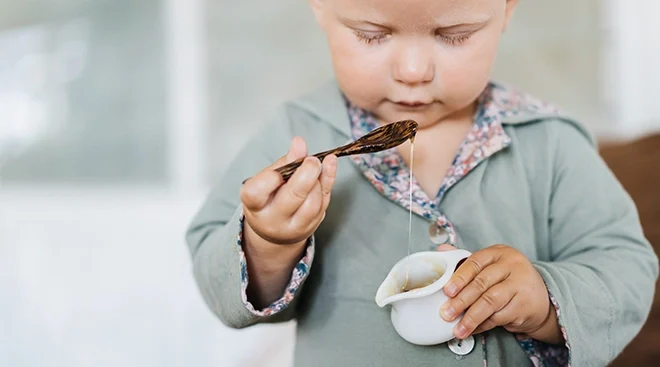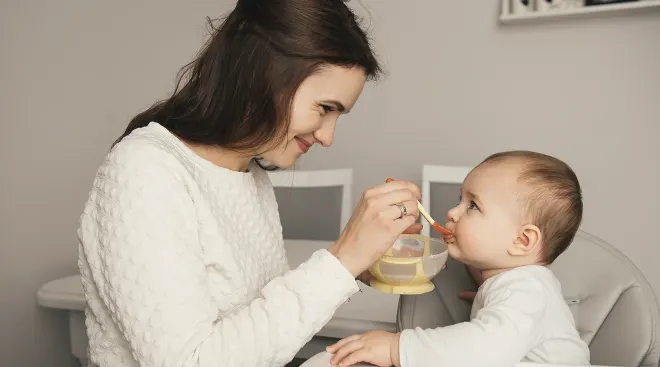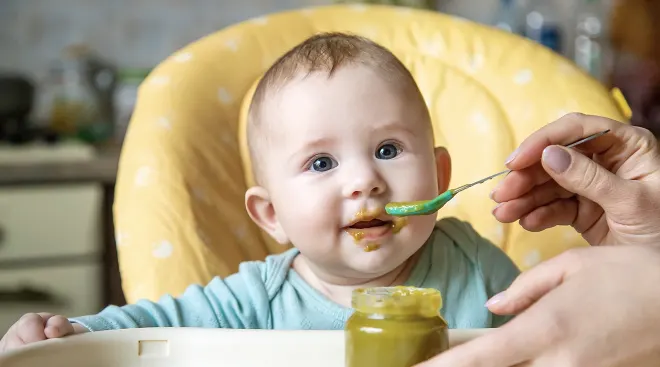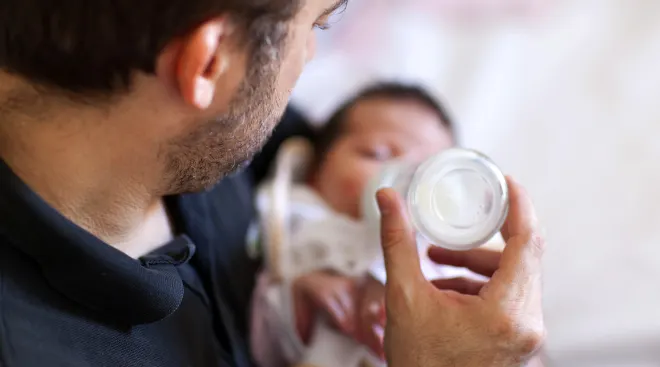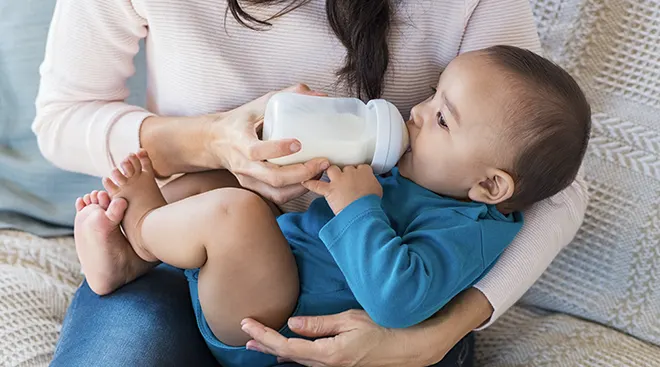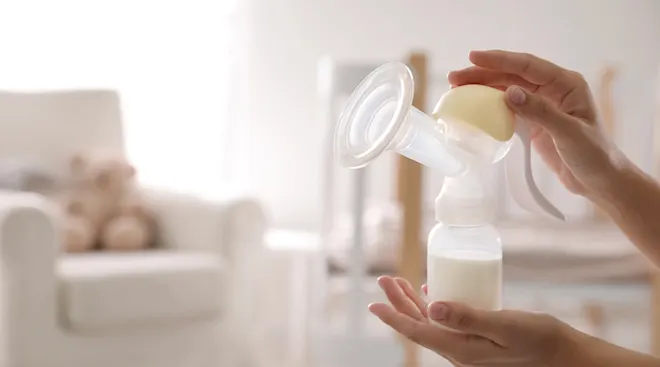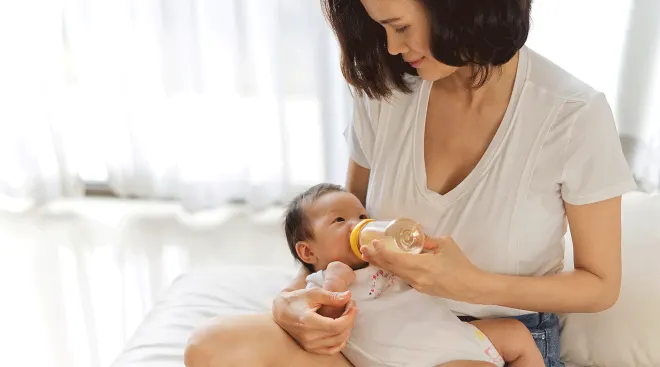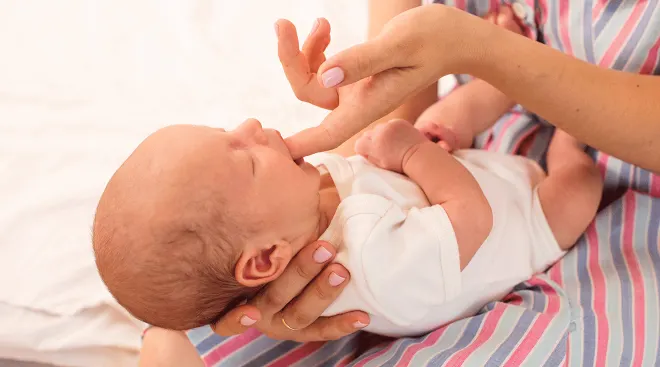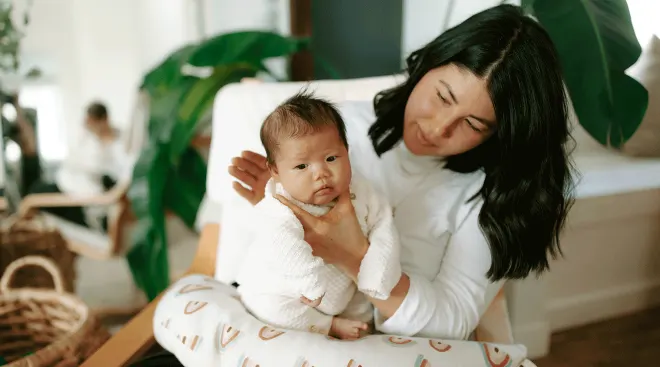When Can Babies Have Honey?
Part of the joy of watching baby grow is seeing them try new things for the first time, especially when it’s a mouthful of something sweet. But one delicious confection you’ll want to hold off on introducing is honey. Pediatricians advise against giving little ones this bee-made sweetener for a while. But why is something so natural off-limits? And exactly when can babies have honey? Here’s what you need to know.
You may be eager to drizzle some honey on your infant’s yogurt every morning, but you’ll have to wait. The American Academy of Pediatrics (AAP) advises against giving honey to babies younger than 12 months old. The good news? Once your sweetie turns one, honey is considered safe and fair game.
The big concern with babies and honey is infant botulism, a rare but serious disease that can lead to abnormal functioning of the nerves, which can cause weakness and even paralysis, according to the AAP.
Botulism is caused by toxins that are produced by the spore-forming bacteria clostridium botulinum. Food-borne botulism (botulism that’s caused by something you eat) happens when food becomes contaminated with this bacteria and then is stored improperly; this allows the bacteria to grow and make toxins. “These spores can be found in raw honey,” says Andrea Hadley, MD, section chief and pediatric hospitalist at Helen DeVos Children’s Hospital in Grand Rapids, Michigan. And babies under 6 months old are at greatest risk of developing infant botulism.
About 90 percent of cases happen in the United States; it’s estimated that more than 250 cases occur in the US each year, according to a report published in American Family Physician (AFP). Of the cases reported to the Centers for Disease Control and Prevention (CDC), about 15 percent of those babies have a history of eating honey. Based on microbiologic testing, up to 25 percent of honey products contain botulism spores.
The chances of baby contracting botulism are low, but if they do, it can have serious consequences. About 70 percent of infants with botulism require mechanical ventilation for an average of 23 days, and the average hospital stay is 44 days, according to the AFP report. Given that “honey is not nutritionally necessary for babies,” Hadley says, “the risks of giving honey to infants outweighs any benefit.”
So why is it suddenly okay to give baby honey once they hit their first birthday? “After 12 months, the human immune system has developed enough that if you do encounter botulism in honey, your immune system can handle it,” explains Jamie Alan, PhD, an associate professor of pharmacology and toxicology at Michigan State University.
The recommendation for babies to avoid eating honey applies to all forms of honey, including pasteurized honey. Pasteurization doesn’t usually kill off botulism, because the spores help the bacteria withstand extreme conditions, Alan explains. You also want to avoid honey in snacks and other foods. So if you’re wondering if babies can have honey graham crackers, Honey Nut Cheerios or similar processed honey snacks, the answer is no. “The spores are resistant to normal cooking and baking processes,” Hadley says.
“This is a ‘better safe than sorry’ situation,” Alan says. “The likelihood of exposure is very low, but there are so many other options that there really is no need to feed a baby honey [snacks].”
Don’t panic if baby accidentally eats honey—or if their grandparents slip them a honey cereal bite behind your back. “Most honey doesn’t actually contain the spores, so the risk of developing botulism after one accidental ingestion is extremely low,” Hadley says. Nevertheless, she adds that, in the event of ingestion, it’s a good idea to keep an eye on baby to look for any potential symptoms of infant botulism.
Symptoms of infant botulism to look out for
Infant botulism is rare, but it can happen—and it’s potentially fatal without treatment. The AAP recommends watching for these symptoms three to 30 days after baby is exposed:
- Constipation
- A weakened cry
- Loss of facial expression
- A reduced gag reflex
- Slow feeding
- Overall weakness or floppiness
Never hesitate to reach out to your pediatrician if you’re concerned.
Once baby turns one, it’s considered safe for them to have honey. Better yet, you don’t need to do anything special to share the sweet stuff with them. “It’s recommended to introduce honey just as you would introduce any other food,” Hadley says. “Give it to them the same way you’d consume it.” So go ahead—drizzle away and watch your little honey-bunny enjoy!
About the experts:
Jamie Alan, PhD, RPh PharmD, is an associate professor of pharmacology and toxicology at Michigan State University. She earned her doctor of pharmacy degree from Ohio Northern University.
Andrea Hadley, MD, is section chief and a pediatric hospitalist at Helen DeVos Children’s Hospital in Grand Rapids, Michigan. She earned her medical degree from the University of Michigan.
Please note: The Bump and the materials and information it contains are not intended to, and do not constitute, medical or other health advice or diagnosis and should not be used as such. You should always consult with a qualified physician or health professional about your specific circumstances.
Plus, More from The Bump:
Navigate forward to interact with the calendar and select a date. Press the question mark key to get the keyboard shortcuts for changing dates.
































